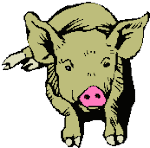It was hard not to notice a dispute within the British government, in recent days over whether there is a human risk from horse meat or not. What is not so obvious is the links to sick pigs and MRSA st398.
On balance, we felt sorry for the Defra Minister, Owen Paterson. He was in an impossible position and, aside from noting that MRSA st398 is known to be present in horses and equine veterinarians, there was nothing to add to the "bute" risks as expressed by the Minister.
But the chair of the Agriculture Select Committee, Anne McIntosh, felt very differently and was on the TV during the weekend insisting on an immediate ban on all imported processed beef.
Britain cannot do that under EU rules, and Anne McIntosh, would obviously know that.
The implication was that Anne McIntosh thought the human risks were high enough to justify unilateral action against EU processed beef.
It was not the best performance by the Select Committee Chair, it was easy to dismiss it as internal politicking, but then, curious, we started to check on the lady and her background. How well informed is she?
Unusually well qualified and well informed was the answer. She is a massively important player in animal health matters. She is a lawyer, a member of the Scottish Bar, working for a time for the EU.
Anne McIntosh, like so many of us, has mixed parentage, in her case Scots-Danish, giving her several languages including Danish. She represents an English constituency thick with pig enterprise and associated antibiotic resistant disease.
She will know, for example, that the local pig vets blamed the Scots for the introduction of some antibiotic resistant diseases to her constituency. She has also previously been MEP for the pig dense English constituency of North Essex and South Suffolk.
McIntosh will know all about pig disease and the problems of the pig industry, most probably including the current MRSA st398 disaster in Denmark including the private comments of the Danes, not usually
reachable in English.
So, she will be well up to speed on the full implications of the MRSA st398 known to be present in horses and equine veterinarians and perhaps the pig DNA found alongside the horse meat, recently.
As the current Chair of the Agriculture Select Committee, she must be aware of the writer's allegations about being threatened as a result of giving evidence to them about test faking by the British veterinary civil service. Well before her time, of course.
So, Anne McIntosh being worried about human health implications of the horse meat, should ring all the alarm bells.
We also found this from 2011 suggesting that whatever the eventual arguments, there was at least some concern that the rule for micro chipping horses were not working, and that might result in British horse meat with banned veterinary drugs reaching the export market (as indeed we know it did). The story was also carried by the veterinary media at the time.
The full Daily Mail report is
here
Government pays PR company £45,000 to tell travellers not to turn their horses into food
By HUGO GYE
UPDATED: 16:23, 27 September 2011
A Government department paid a PR company thousands to inform travellers about a law governing the consumption of horses.
The Department for Environment, Food and Rural Affairs handed Linstock Communications over £45,000 to raise awareness of the new law among travellers.
It incurred the huge bill despite having a large public-relations team of its own.
